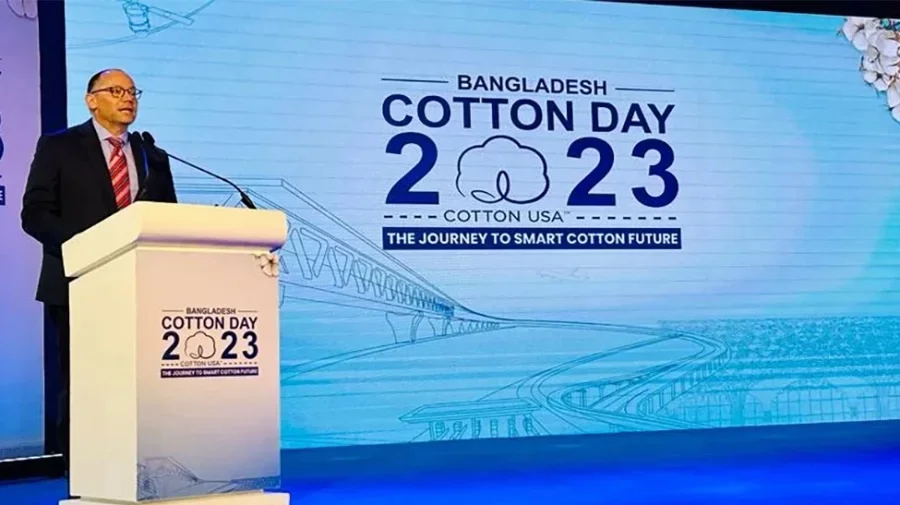Haas: Labour rights critical to growth of Bangladesh’s RMG sector
Share on:

‘Strong labour laws and their implementation are vital to bilateral relationship’
US Ambassador to Bangladesh Peter Haas on Thursday said his country looks forward to deepening work with the private sector and other stakeholders in Bangladesh to advance internationally recognized labour rights in the RMG industry and beyond.
“The recent minimum wage review for the readymade garment sector has demonstrated the clear need for an objective, inclusive and evidence-based National Wage Policy that addresses the severe economic challenges faced by garment workers,” he said while speaking at an event marking Bangladesh Cotton Day 2023.
Bangladesh Garment Manufacturers and Exporters Association (BGMEA) President Faruque Hassan and Bangladesh Textile Mills Association (BTMA) President Mohammad Ali Khokan also spoke at the opening session.
Haas said strong labour laws and their implementation are vital to bilateral relationship, sustainable and inclusive development, and to support a stable and predictable operating environment for US companies operating in Bangladesh.
“As we look at the readymade garment sector, one of our mission’s priorities here in Bangladesh is a sustainable and broadly shared prosperity realized through improved labour standards,” the US ambassador said.
“This brings me to labour rights which are critical to the continued growth and sustainability of the readymade garment sector in Bangladesh,” he added.
The US envoy reminded that on November 16, US Secretary of State Antony Blinken announced the new US Presidential Memorandum on “Advancing Worker Empowerment, Rights, and High Labor Standards Globally.”
“This new global labour strategy calls on all US government agencies to intensify engagements with governments, labour organizations, trade unions, civil society, and the private sector to promote and protect the rights to freedom of association and collective bargaining,” he said.
“I again want to thank all of you for being great partners with the United States and great customers of US cotton. I hope today’s event will be beneficial for you and teach you even more about the benefits of including US cotton in your business,” he said.
Bangladesh is a major market for US cotton and this annual Cotton Day event is a fantastic way to bring together everyone who uses US cotton from the spinning mills all the way to the final retail outlet, said ambassador Haas.
This year Bangladesh removed the requirement for US cotton to be fumigated on arrival. The removal of the cotton fumigation requirement is one of the biggest economic trade successes the Embassy achieved in 2023.
“But this is not just a success for the United States; it is a win for all of you in Bangladesh, as it allows you faster access to high quality US cotton with lower costs,” Haas said.
The removal of the fumigation requirement is saving individual mills up to $35,000 a year and is reducing the amount of time it takes to clear customs by several days.
In 2022, US cotton exports reached almost $470 million, which represented 15% of total US exports to Bangladesh.
“While exports are down this year for a variety of factors, we are still seeing inroads for US cotton in Bangladesh, as the percentage of the US market share is growing,” said the US envoy.
Through the US Cotton Trust Protocol, he said, the United States can offer a transparent supply of sustainable cotton, which is being demanded by brands around the world.
The envoy said the entire world is facing the challenge of climate change, and droughts, pests, and other impacts of climate change as well as proactively working to mitigate greenhouse gas emissions.
The Cotton Trust Protocol sets a new standard in sustainably grown cotton, ensuring it contributes to the protection and preservation of the planet, using the most sustainable and responsible techniques, he said.
The envoy said the growth of the US Cotton Trust Protocol program in Bangladesh is remarkable. The Cotton Trust Protocol was launched in 2020, and in just three years over 190 mills and manufacturers have enrolled.
All sectors of the Bangladesh textile industry can join and benefit from the protocol and the program continues to add leading American brands such as Macy's and American Eagle Outfitters.
BGMEA President Faruque Hassan requested Ambassador Peter Haas to convey to the US administration on what they are doing for the RMG industry and workers.
“What Bangladesh is doing for its garment workers and environment positively needs appreciation and recognition for our positive efforts,” he said.
Source: UNB

